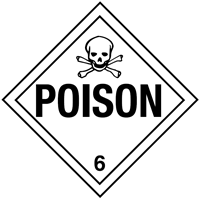
 Print
Print
Chemical Datasheet
CARBON TETRABROMIDE |

|
Chemical Identifiers
| CAS Number |
UN/NA Number |
DOT Hazard Label |
USCG CHRIS Code |
|
|
|
|
none
|
| NIOSH Pocket Guide |
International Chem Safety Card |
|
Carbon tetrabromide
|
|
NFPA 704
data unavailable
General Description
A colorless crystalline solid. Much more dense than water and insoluble in water. Toxic by ingestion. Vapors are narcotic in high concentration. Used to make other chemicals.
Hazards
Reactivity Alerts
none
Air & Water Reactions
Insoluble in water.
Fire Hazard
Excerpt from ERG Guide 151 [Substances - Toxic (Non-Combustible)]:
Non-combustible, substance itself does not burn but may decompose upon heating to produce corrosive and/or toxic fumes. Containers may explode when heated. Runoff may pollute waterways. (ERG, 2024)
Health Hazard
Excerpt from ERG Guide 151 [Substances - Toxic (Non-Combustible)]:
Highly toxic, may be fatal if inhaled, ingested or absorbed through skin. Avoid any skin contact. Fire may produce irritating, corrosive and/or toxic gases. Runoff from fire control or dilution water may be corrosive and/or toxic and cause environmental contamination. (ERG, 2024)
Reactivity Profile
CARBON TETRABROMIDE is incompatible with the following: Strong oxidizers, hexacyclohexyldilead, lithium (NIOSH, 2024).
Belongs to the Following Reactive Group(s)
- Halogenated Organic Compounds
Potentially Incompatible Absorbents
No information available.
Response Recommendations
Isolation and Evacuation
Excerpt from ERG Guide 151 [Substances - Toxic (Non-Combustible)]:
IMMEDIATE PRECAUTIONARY MEASURE: Isolate spill or leak area in all directions for at least 50 meters (150 feet) for liquids and at least 25 meters (75 feet) for solids.
SPILL: Increase the immediate precautionary measure distance, in the downwind direction, as necessary.
FIRE: If tank, rail tank car or highway tank is involved in a fire, ISOLATE for 800 meters (1/2 mile) in all directions; also, consider initial evacuation for 800 meters (1/2 mile) in all directions. (ERG, 2024)
Firefighting
Excerpt from ERG Guide 151 [Substances - Toxic (Non-Combustible)]:
SMALL FIRE: Dry chemical, CO2 or water spray.
LARGE FIRE: Water spray, fog or regular foam. If it can be done safely, move undamaged containers away from the area around the fire. Dike runoff from fire control for later disposal. Avoid aiming straight or solid streams directly onto the product.
FIRE INVOLVING TANKS, RAIL TANK CARS OR HIGHWAY TANKS: Fight fire from maximum distance or use unmanned master stream devices or monitor nozzles. Do not get water inside containers. Cool containers with flooding quantities of water until well after fire is out. Withdraw immediately in case of rising sound from venting safety devices or discoloration of tank. ALWAYS stay away from tanks in direct contact with flames. For massive fire, use unmanned master stream devices or monitor nozzles; if this is impossible, withdraw from area and let fire burn. (ERG, 2024)
Non-Fire Response
Excerpt from ERG Guide 151 [Substances - Toxic (Non-Combustible)]:
Do not touch damaged containers or spilled material unless wearing appropriate protective clothing. Stop leak if you can do it without risk. Prevent entry into waterways, sewers, basements or confined areas. Cover with plastic sheet to prevent spreading. Absorb or cover with dry earth, sand or other non-combustible material and transfer to containers. DO NOT GET WATER INSIDE CONTAINERS. For solids, prevent dust cloud and avoid inhalation of dust. (ERG, 2024)
Protective Clothing
Excerpt from NIOSH Pocket Guide for Carbon tetrabromide:
Skin: No recommendation is made specifying the need for personal protective equipment for the body.
Eyes: PREVENT EYE CONTACT - Wear appropriate eye protection to prevent eye contact.
Wash skin: DAILY - The worker should wash daily at the end of each work shift, and prior to eating, drinking, smoking, etc.
Remove: No recommendation is made specifying the need for removing clothing that becomes wet or contaminated.
Change: DAILY - Workers whose clothing may have become contaminated should change into uncontaminated clothing before leaving the work premises.
Provide: EYEWASH - Eyewash fountains should be provided in areas where there is any possibility that workers could be exposed to the substances; this is irrespective of the recommendation involving the wearing of eye protection. (NIOSH, 2024)
DuPont Tychem® Suit Fabrics
No information available.
First Aid
Excerpt from NIOSH Pocket Guide for Carbon tetrabromide:
Eye: IRRIGATE IMMEDIATELY - If this chemical contacts the eyes, immediately wash (irrigate) the eyes with large amounts of water, occasionally lifting the lower and upper lids. Get medical attention immediately.
Skin: SOAP WASH PROMPTLY - If this chemical contacts the skin, promptly wash the contaminated skin with soap and water. If this chemical penetrates the clothing, promptly remove the clothing and wash the skin with soap and water. Get medical attention promptly.
Breathing: RESPIRATORY SUPPORT - If a person breathes large amounts of this chemical, move the exposed person to fresh air at once. If breathing has stopped, perform artificial respiration. Keep the affected person warm and at rest. Get medical attention as soon as possible.
Swallow: MEDICAL ATTENTION IMMEDIATELY - If this chemical has been swallowed, get medical attention immediately. (NIOSH, 2024)
Physical Properties
Flash Point: data unavailable
Lower Explosive Limit (LEL): data unavailable
Upper Explosive Limit (UEL): data unavailable
Autoignition Temperature: data unavailable
Melting Point:
194°F
(NIOSH, 2024)
Vapor Pressure:
40 mmHg
at 205°F
(NIOSH, 2024)
Vapor Density (Relative to Air): data unavailable
Specific Gravity:
3.42
(NIOSH, 2024)
- Denser than water; will sink
Boiling Point:
374°F
at 760 mmHg
(NIOSH, 2024)
Molecular Weight:
331.7
(NIOSH, 2024)
Water Solubility:
0.02 %
(NIOSH, 2024)
Ionization Energy/Potential:
10.31 eV
(NIOSH, 2024)
IDLH: data unavailable
AEGLs (Acute Exposure Guideline Levels)
No AEGL information available.
ERPGs (Emergency Response Planning Guidelines)
No ERPG information available.
PACs (Protective Action Criteria)
No PAC information available.
Regulatory Information
EPA Consolidated List of Lists
No regulatory information available.
CISA Chemical Facility Anti-Terrorism Standards (CFATS)
No regulatory information available.
OSHA Process Safety Management (PSM) Standard List
No regulatory information available.
Alternate Chemical Names
- CARBON BROMIDE
- CARBON BROMIDE (CBR4)
- CARBON TETRABROMIDE
- METHANE TETRABROMIDE
- TETRABROMOMETHANE


 Print
Print
